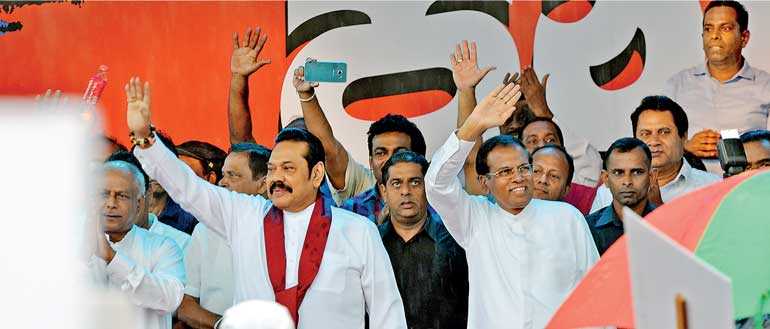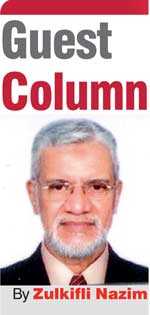Wednesday Feb 18, 2026
Wednesday Feb 18, 2026
Tuesday, 1 October 2019 01:01 - - {{hitsCtrl.values.hits}}

The Rajapaksa regime was run by a family clique whose corrupt nepotism had few parallels anywhere else in the world, outside perhaps the monarchies of Saudi Arabia or Ethiopia. Maithripala Sirisena, despite stating vehemently that one of the reasons for him contesting for the presidency was to put an end to nepotism and family bandyism, has acted in contrary to what he proclaimed – Pic by Shehan Gunasekara
As the saying goes, democracy is two wolves and a sheep voting on what to have for lunch.
Benjamin Franklin comes to expressing this sentiment where he writes in a letter dated 1 November 1773 to Jane Mecom, “There is truth in the old saying, that if you make yourself a sheep, the wolves will eat you.” In the same letter he mentions, “I have held up a looking-glass in which some ministers may see their ugly faces, and the nation its injustice.”
And the Holy Bible says in Ezekiel 22:27 – “Your leaders/politicians are like wolves prowling and killing and rapaciously taking whatever they want.” (The Living Bible & Bible Study Tools)
Voting and the will of the people
Most of us think of voting as the cornerstone of a true democracy. When any country in the developing world moves towards democracy, we tend to judge its initial success by how soon it is able to hold “free and fair” elections. We rejoice in this coming of age.
Indeed, the Universal Declaration of Human Rights presents voting as one of our fundamental rights: “The will of the people shall be the basis of the authority of government; this will shall be expressed in periodic and genuine elections which shall be by universal and equal suffrage and shall be held by secret vote or by equivalent free voting procedures.”
But this is the whole problem: voting has come to actively undermine “the will of the people” and we need a system that will restore their primacy. 
Voting as a way of choosing politicians dates to the 18th century, the time of the American and French revolutions, and there is little doubt that the leaders of these revolutions chose voting precisely as a means of exerting control by the rich and powerful over the political process.
Even as we have fought to remove such representations in government, which has become the norm in most modern democracies, it has degenerated into a way for powerful and tyrannical dictatorship to maintain control over the “democratic” process, because it is those who are willing to represent the interests of “powerful elites” – who are most likely to have the time and resources to ensure they are elected.
A thorough study shows that democracies give way to tyrannies when mob passion overwhelms political wisdom and a populist autocrat seizes the masses. But the tyrant is not quite a tyrant at first. On the contrary, in a democracy the would-be tyrant offers himself as the people’s champion. He’s the ultimate simplifier, the one man who can make everything whole again.
Tyranny occurs when absolute power is granted to a ruler. In a tyrannical government, the ruler becomes corrupt and uses his power to further his own interests instead of working for the common good. They have proven to be greedy for power, racially motivated with all their words and actions only to gather support to continue in power.
There is no such thing as having the people in mind. Rather it is only their political survival in their thoughts.
We have seen this as a sustained phenomenon innumerable number of times.
Rajapaksa nepotism
We all experienced this phenomenon where we have seen family bandyism rearing its ugly head – The Rajapaksa regime was run by a family clique whose corrupt nepotism had few parallels anywhere else in the world, outside perhaps the monarchies of Saudi Arabia or Ethiopia.
To recap – Mahinda Rajapaksa himself was not only the President but Minister of Defence. His brother Gotabaya Rajapaksa, a former military officer, was the former Secretary of the Ministry of Defence until Mahinda Rajapaksa’s presidency was over on 9 January 2015.
A younger brother Basil Rajapaksa, was appointed Minister of Economic Development. His eldest brother Chamal Rajapaksa was elected Speaker of the 14th Parliament of Sri Lanka. His nephew, Shashindra Rajapaksa, the eldest son of Chamal Rajapaksa, was the Chief Minister of the Uva Province.
Shameendra Rajapaksa (second son of Chamal Rajapaksa), was appointed Director of Sri Lankan Airlines, his cousins Jaliya Wickramasuriya Sri Lanka’s Ambassador to the United States, Udayanga Weeratunga, Sri Lanka’s Ambassador to Russia, Prasanna Wickramasuriya, Chairman Airport and Aviation Services Ltd. Sri Lanka and Rajapaksa›s brother-in-law Nishantha Wickramasinghe as the Chairman of SriLankan Airlines.
This is nepotism galore and this is nepotism unprecedented.
Sirisena nepotism
How about the incumbent president Maithripala Sirisena?
Maithripala Sirisena, during his initial campaign at a media conference where he announced that he would be running for President stated vehemently that one of the reasons for him contesting for the presidency was to put an end to nepotism and family bandyism.
Contrary to what he proclaimed, President Sirisena appoints himself as the Minister of Defence. He then assigns his son-in-law Wewelpanawa Gamage Thilina Suranjith as the Public Relations Officer of the Defence Ministry.
President Sirisena had another shock up his sleeve – he appoints his brother Pallewatta Gamaralalage Kumarasinghe Sirisena as the Chairman of Sri Lanka Telecom barely 18 days after seizing power
He even brings his daughter to even be the chief guest in such a distinguished ministry including a spate of other nominations as chief guests in various schools; and the chief guest annual concert of the Naval Pre-schools of SLNS Gamunu, SLNS Tissa and SLNS Dakshina at the Navy Headquarters in Colombo on 6 December 2015 takes the cake.
Is this how President Sirisena puts an end to nepotism and family bandyism?
It is unconscionable that any person with a sliver of empathy would condone these acts of nepotism and favouritism. If this isn’t evil, we don’t know what is.
Presidential Election and abolition of the Executive
The people of this country are utterly confused and disturbed because of the current trend – the Presidential Election circus. The people are being misled and the country is in a state of disarray. This farce takes the place of genuine political life and it costs a lot of money to mount this spectacle. The campaign sustains the fiction of a democracy and gives legitimacy to a situation which is closely related to fascism.
The black media, unfettered and unbridled, steps in at this juncture. In this brave new world, the politician required a persona, an actor’s portrayal of someone in a play that the media welcomed. In other words, politicians became media performers and the media now judged the performance. And this process is being repeated on a daily basis. The unscrupulous black media plays havoc, without realising the fact that they too were subject to tyranny and heavy censorship during a dictatorial regime.
At the same time we cannot forget the fact that years ago, the rising toll of attacks on genuine and honest journalists was the norm – and the fact that almost all of the crimes went unpunished. Assassinations not only cut short individual lives, but attack freedom of expression, exacting a broader toll on society.
Today, those concerns are more serious and widespread than ever. Some were killed by criminals and armed groups; but the majority was murdered intentionally and with premeditation by or on behalf of politicians.
We elect the wrong person and the most extreme form of tyranny and frightening manifestation of broader pressures will be rampant.
People should know that tyranny is a phenomenon that operates by principles by which it can be recognised in its early emerging stages. If the people are vigilant, prepared, and committed to liberty, they can counter it before it becomes entrenched. But if they are greedy self-serving you can be rest assured that tyranny and excessive narcissism will raise their ugly monstrous heads once again and this time it will know no bounds.
The nexus of crime and politics is certainly not specific to Sri Lanka. There are similar examples from a range of democracies; the West too is hardly immune.
It’s not surprising, given the fatuous spectacle into which our politics has degenerated, that so many Sri Lankans have given up on the political process altogether, or that a growing fraction of Sri Lankans have gone veering off into political extremism.
Voter ignorance
You might assume that political candidates with a criminal record wouldn’t get far at the polls. But research shows that’s not always the case.
In the broader political economy literature, the conventional wisdom suggests that voter ignorance is a prime factor for why criminal or corrupt politicians win elections.
Here, we are speaking of allegations of attempted murder, assaulting public officials, or theft.
Despite the plausibility of this “ignorant voters” hypothesis, voters are quite knowledgeable about candidates’ backgrounds. But, in spite of the availability of this information, voters still lend their support to candidates with criminal reputations.
The main argument is that voters have a strategic rationale for backing candidates with criminal records. In settings where two conditions are present—weak or unevenly enforced rule of law and highly salient social divisions—politicians can use their criminality as a signal of their credibility when it comes to protecting constituents’ interests. In other words, when social tensions are rife and the credibility of the state is weak, many voters might seek refuge in the hands of a strongman who can fill in for the state’s various governance deficits in service of his particular social or ethnic community.
This turns the traditional “information asymmetry” argument on its head.
Trying to satisfy party colleagues, civil servants, constituents, stakeholders, the media and the public is incredibly challenging. It is not simply that voters are making a trade-off between honesty and competence; it is that a lack of honesty or probity actually signifies competence. The difference between the two equilibriums probably has a lot to do with the weakness of the state’s writ in many developing societies.
There are some who argue that voters, when making electoral choices, often make a mental trade-off between honesty and competence. If you encounter a politician who is corrupt or dishonest, you might be willing to look the other way when it comes to allegations of malfeasance because you rate him or her to be highly effective.
In these settings, there might be a premium on having a representative who is willing to run foul of the law in order to “get things done.”
We can only state that the future of our beloved country Sri Lanka, is in on trial
We the people need to wake up! Believe it or not, our beloved Sri Lanka and its impact on the future generation is in jeopardy.
Concluding with guidance from Lord Buddha: “What is evil? Killing is evil, lying is evil, slandering is evil, abuse is evil, gossip is evil, envy is evil, hatred is evil, to cling to false doctrine is evil; all these things are evil. And what is the root of evil? Desire is the root of evil, illusion is the root of evil.”